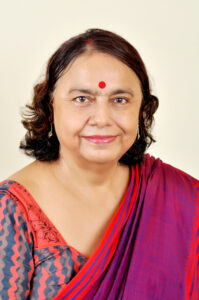 Trishna could never come to terms with the incident! She brooded over the loss of her dear grandfather Satishchandra Chatterjee. She held herself guilty for his passing away. Thirty years have elapsed since he died in this house where she was born and grew up.
Trishna could never come to terms with the incident! She brooded over the loss of her dear grandfather Satishchandra Chatterjee. She held herself guilty for his passing away. Thirty years have elapsed since he died in this house where she was born and grew up.
The house was built by her great grandfather after he had permanently settled in Calcutta after the Partition. Starting from a humble one roomed shelter it took years to come up as a two storied edifice bit by bit. Her grandfather and father had also seen the light of day in this house and remained rooted within its ribs till their last breath.
When Trishna was born to the parents of a middle class family, the Chatterjees had reason enough to rejoice. After two still born sons, Amala was blessed with a beautiful baby girl. The gender of the offspring was of little importance to Amala, her husband Bimal and the patriarch Satishchandra Chatterjee, her father in law.
The relatives and friends of the family had often harped on the necessity of observing brata and manats by Amala after the previous twin mishaps. But the family being progressive in outlook had no faith on divine interventions to safeguard child bearing. Bimal, a scientific officer, believed that the Rh incompatibility of her wife could probably be the culprit in the previous disasters. Eventually when motherhood turned out to be a reality for Amala and a girl was born, she was beside herself with joy. Nestling the baby close to her bosom, she, for the first time sniffed the raw aroma of her fertile womb and breathed a prayer for her wellbeing.
But more than anyone else Bimal’s father was the person who was elated at the event of a girl child being born in the family. He was a widower and had lost his wife when Bimal was barely six years old. Being handsome and in the prime of life, proposals for his remarriage poured in from all quarters. The urgency of a remarriage intensified on the ground that the child was too small and needed a mother. But Satish was not the one to buckle under inordinate pressure. He did not believe in the gendered concept of motherhood and felt himself capable of giving the motherly affection and care which the child was entitled to. A matronly woman was engaged as a live in maid to look after the household chores and take care of the child in the father’s absence.
Little Bimal flipped through the pages of the album where pictures of the family members were tucked in pockets and he felt a lump in his throat. When his friends in school shared with him their tiffin lovingly prepared by their mothers he delved into a void and a pang of loss echoed in his heart. But time was the best healer, a balm to the emotional scar sustained early in life. Gradually remembrances of his mother became vague as the father emerged as an icon of non-binary parenting.
Bimal graduated in Zoology and completed his Ph.D. in the subject. On the day of his first appointment as a scientific officer in a government concern a matrimonial proposal came from respectable family. It just took a couple of weeks for the marriage with Amala to be finalised. The addition of female member, Satishchandra’s Bouma (daughter in law) in the household enlivened his spirits. After the demise of his wife he had suffered a niggling pain at the absence of a woman in the household. Then his daughter in law stepped in and now a granddaughter being born after two mishaps was sheer delight. Lakshmi was here to light up the household!
Needless to say Trishna was the recipient of profuse love, being pampered to the extreme. She was the apple of her grandfather’s eyes. Many found a strange resemblance of the girl with her grandmother, the curve of her lips, and the deep pool of her eyes spoke of it. Wasn’t that itself reason enough for the old man to dote on the reincarnation of his long lost wife? Though the family was liberal in their dealing with her, she was destined to remain fettered in this house throughout her life.
When Trishna finished her board examination she expressed her wish to study English literature in a reputed college in Delhi. Her grandfather came up with an irrefutable comment, “I think there are equally prestigious institutions in Kolkata!” This metaphorically stood for an unambiguous “No.” Her parents too coaxed her to carry on her studies in her home town with the much uttered Bengali phrase “barir bhat kheye”( having food at home). In the conflict which raged within her; the urge to remain home won the battle. She succumbed to a compelling attachment to her grandfather and the aroma of her house. Intuitively she sensed a premonition of disaster in the event of a probable parting with her dear grandfather.
So 121, Bhupen Dey Road remained her permanent place of shelter even as offers from distant Universities situated outside Bengal perplexed her. After completing her Ph.D and clearing the NET Trishna was fortunate enough to get an appointment in one of the colleges of Kolkata. Satishchandra breathed a sigh of relief on receiving the news.
It was at a national seminar held in her college that Trishna got acquainted with Dr.Tapobrata Banerjee, the key note speaker from a college in Chennai. He was elder to her by ten years but age and seniority didn’t prove to be a barrier in building up a friendship between them. The attachment spiralled to a deep emotional attachment as days passed.
The inevitable result of the relation was marriage on a balmy twilight in the month of March. But wedlock didn’t necessitate parting with her family as Trishna’s job was in Kolkata. So post marriage the days were spent shuttling between Kolkata and Chennai for the couple. The romantic effusion of pre marriage days remained unabated in sporadic meetings and living together for odd days. Thus, Trishna ‘s bonding with her own family specially her grandfather deepened even after marriage, it promised to be a lifelong unhindered kinship under the roof of 121, Bhupen Dey Road.
After a couple of years when Trishna conceived, the proposal for a shift in address came from Tapobroto– at first mild and then emphatic. He asked Trishna to consider the possibility of permanently settling down in Chennai. A hesitant Trishna could not think of stepping out of this comfort abode leaving back her parents and dear grandfather. Moreover the birth of a baby would entail added responsibilities which could be best taken care of by her parents. Satishchandra had again spelt out his unambiguous “NO” by a subtle remark, “I think the baby needs its great grandfather more than the parents!” And above all how could Trishna forsake her job and truncate her career?
Trishna was always infallible in her decisions and had her way. So the tiny new member Satish’s great granddaughter was born in the very house where her ancestors up to three generations were born and nurtured.Tapobrata now spent more time airborne than on land with his frequent visits to Kolkata. When baby Rinku became a toddler, she was admitted to a playschool which her mother attended. At the age of five when she was about to be admitted to the same school attended by her mother, a replication in the order of events as in the childhood of her mother, a change in the course of life occurred.
Tapobrata was trying heart and soul to bring Trishna and his daughter to Chennai but Trishna was adamant in her decision of sticking to her job in Kolkata. Uppermost in her mind reposed an ardent love for this space where she was born and its inmates. Fortunately at this time a post in English department of a college in Chennai fell vacant. Tapobrata jumped at it and insisted upon her to apply there. Moreover Tapobroto’s mother had lost her husband and was living with him. So there would be no difficulty in rearing the child.
Satishchandra was now an ailing octogenarian. He had lost that spunk and dominating voice of his. His pleading eyes only spoke of the pain at the prospect of an imminent separation with his dear granddaughter. Trishna was on the horns of dilemma. But Satishchandra felt it was eventually time for the let- go!
The interview went off well. Trishna was selected for the post. At last she gave in to her husband’s wish and decided to accompany her husband and relocate in Chennai. As the day of their departure advanced it became hard for Trishna to reconcile herself with the thought of leaving that house and her grandfather Satishchandra. A slice of her heart remained ensconced in the house where she had spent thirty-four springs of her life. Rinku too whimpered inconsolably much taken aback at the sudden change about to take place.
A day after reaching Chennai the heart breaking news came over the phone. It was delivered by Trishna’s father, “Your dadu (grandfather) is no more; he died peacefully in his sleep.” After this heart rending incident some thoughts persistently plagued Trishna. Can the absence of one close to the heart precipitate such fatal consequence? Can emotional turmoil destabilise one’s very existence? Trishna’s mind reeled under a spate of guilt and penitence!
******************
Decades later the canvas had changed. Trishna was then a widower in her sixties. Her parents too were no more. It was just the two of them Trishna and Rinku residing together in 121, Bhupen Dey Road. After the death of her parents in successive years, Trishna returned to Kolkata under this roof drenched in memories. Devastated with four deaths she clung to her daughter like a child. After the death of her mother the last mishap, she returned to Kolkata in a state of torpor. She couldn’t bear to think of the house being rented out or bear the brunt of time’s ravage.
Now Rinku had grown up into a lovely young lady working in the field of genetic science. Soon she would be leaving for the States to University of California, Los Angeles on a job offer. Trishna became apprehensive. Would there be a recurrence of an incident which occurred years ago in this house when she had permanently left for Chennai? Separation since then had an ominous significance to her.
Rinku could read her mom’s mind. Though she was just a kid when her great grandpa had suddenly expired, it did leave a deep scar in her mind. She was very well aware that her mother though mentally shattered would never be in the path of her building up a career abroad. Nor would she leave the house in Kolkata to stay with her.
The day of her departure arrived. The flight was scheduled at a time past midnight, so Trishna did not accompany her daughter to the airport. She bade her good bye from the porch of her house. Resigning herself to the fate of a life forlorn in that house, as if a prop to its very existence she entered its looming darkness.
That night she flitted seamlessly in and out the realm of sleep and awakening with an uneasiness which had been her companion for quite some days. When the first rays of light pierced through the unburdened gloom of sky there was a faint knock on the front door. Still disorientated, she did not pay any heed to it.
Then the buzzer screeched; it rang clear. Trishna could not evade this. She drearily dragged herself like a somnambulist and opened the front door of 121, Bhupen Dey Road.
There stood her daughter!
The golden orb peeped through the tallest tree in their garden and shone upon Rinku’s ebullient face.
*****************









Trishna gets her daughter back to herself 😊. Saga of four generations…very well composed n makes one feel nostalgic about their own family experiences.